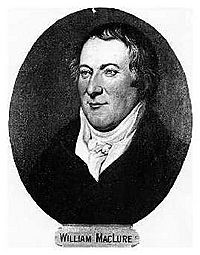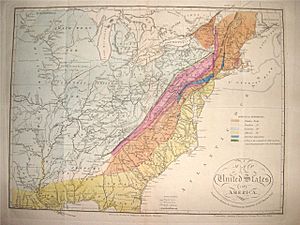William Maclure facts for kids
Quick facts for kids
William Maclure
|
|
|---|---|

William Maclure
|
|
| Born | 27 October 1763 Ayr, Scotland
|
| Died | 23 March 1840 (aged 76) San Ángel, Mexico
|
| Nationality | Born in Scotland |
| Citizenship | American |
| Known for | First geological map of America 1809, and New Harmony Society |
| Scientific career | |
| Fields | geology, education, philanthropy |
| Institutions | Academy of Natural Sciences of Philadelphia |
William Maclure (born October 27, 1763 – died March 23, 1840) was a Scottish-American geologist, a person who studies the Earth's rocks and history. He was also a cartographer, meaning he made maps, and a philanthropist, someone who gives money to good causes. People often call him the 'father of American geology' because of his important work.
Maclure was also interested in new ways of living together in communities. He worked with a British social reformer named Robert Owen in Indiana, United States, to try out these new ideas.
William Maclure had a very successful career as a merchant, which means he traded goods. He made a lot of money and was able to retire early in 1797, when he was only 34 years old. This allowed him to spend his time on science, especially geology, and other interests. In 1809, he created the very first geological map of the United States of America.
Contents
William Maclure's Life Story
Early Life and Business Success
William Maclure was born in 1763 in Ayr, Scotland.
After a short visit to New York City in 1782, he started working for a company called Miller, Hart & Co. This company traded and shipped goods to and from America. Maclure worked in their London office, but he often traveled to France and Ireland for business. In 1796, his work took him to Virginia, which became his new home in America.
In 1803, he visited France as part of a group that helped American citizens get money they were owed by the French government. During the few years he spent in Europe, he became very interested in studying geology.
While living in Switzerland, he was very impressed by a new way of teaching called the Pestalozzi School System. This system was developed by a Swiss teacher named Johann Heinrich Pestalozzi. It focused on hands-on learning and helping children develop naturally.
Creating the First Geological Map
When Maclure returned to America in 1807, he decided to create a geological map of the United States all by himself. He traveled across almost every state, mapping the land. He even crossed the Allegheny Mountains about 50 times!
He shared the results of his hard work with the American Philosophical Society. His report was called Observations on the Geology of the United States explanatory of a Geological Map. It was published along with the first geological map of the country in 1809. This map was made six years before a famous geological map of England was published.
In 1812, while in France, Maclure became a member of a new group called the Academy of Natural Sciences of Philadelphia (ANSP). In 1817, Maclure became the president of the ANSP and stayed in that role for 22 years.
In 1817, he released an updated version of his map and a longer report about the geology of the United States. Later studies have shown that Maclure's observations were mostly correct.
Later Years and Legacy
In 1819, William Maclure visited Spain. He tried to start a farming college near the city of Alicante, but it didn't work out. He returned to America in 1824 and lived for some years in New Harmony, Indiana. There, he tried to build his dream of an agricultural college.
However, his health started to fail, so in 1827, he moved to Mexico, where the climate was better for him. He passed away in 1840 in San Ángel, Mexico, at the age of 77.
In his will, Maclure left most of his money to a special fund. This fund was used to create 160 libraries for working people. This shows how much he cared about education and helping others.
New Harmony Community
The New Harmony community in Indiana was a special place. Many geologists, naturalists (people who study nature), and botanists (people who study plants) were influenced by William Maclure there.
Some of these people included:
- Robert Dale Owen, a social reformer.
- David Dale Owen, a geologist and artist.
- Jane Dale Owen Fauntleroy, an educator.
- Richard Owen, a geologist and the first president of Purdue University.
These people worked with many other smart individuals, including geologists, social reformers, botanists, and engineers.
Places and Plants Named After Maclure
Sometimes, important scientists have things named after them. This is a way to honor their contributions.
Taxonomic Eponyms: Living Things Named After Him
- A new type of fossil ammonite (an ancient sea creature with a spiral shell) was named Maclurite by Charles Alexandre Lesueur.
- The Macluritidae is a family of ancient snails (called gastropods) that lived a very long time ago. This family was named in honor of Maclure.
- The plant genus Maclura is a group of flowering plants in the mulberry family. It was also named after Maclure. This group includes the Osage-orange tree, which has inedible fruit. People use it as a mosquito repellent and grow it as a hedge.
Geological Eponyms: Landforms Named After Him
- Mount Maclure is a mountain located in Yosemite National Park.
- Maclure Glacier is one of the last remaining glaciers in Yosemite National Park.
See also
 In Spanish: William Maclure para niños
In Spanish: William Maclure para niños
 | Valerie Thomas |
 | Frederick McKinley Jones |
 | George Edward Alcorn Jr. |
 | Thomas Mensah |


